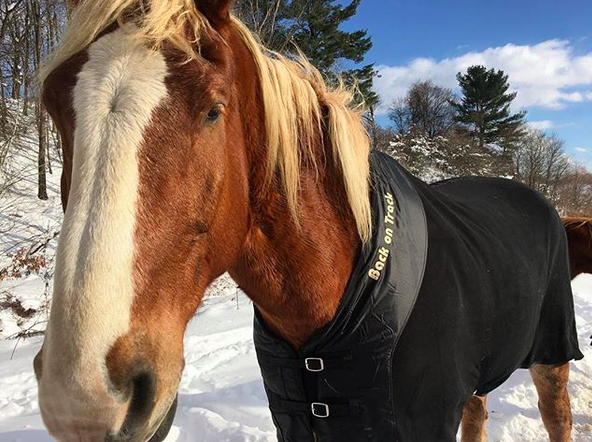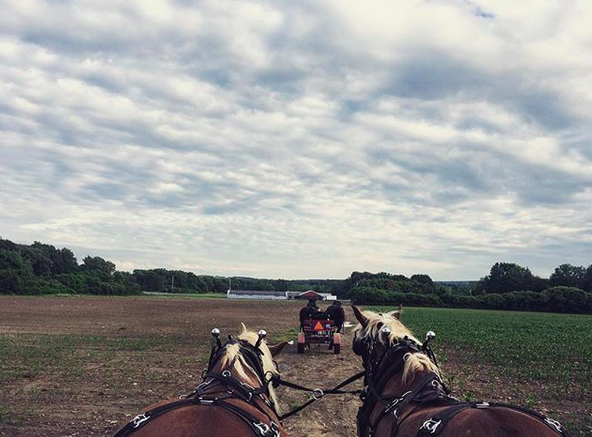
#TBT: 6 Reasons Why Old Horses Are the Best Horses
Whether you’ve worked with an old schoolmaster or have a pasture full of retirees at home, old horses find a way to weave themselves into our hearts forever.
I’ve been lucky in my horse life to have worked with the full range of equine experiences: I’ve helped halter-break babies; I’ve started young horses under saddle; I’ve trained green beans and helped discover where their calling might be in the horse world; I’ve rehabilitated plenty of former show horses into a “semi-retired” teaching role; I’ve maintained some seniors and helped ease horses from this life when humane euthanasia was the kindest gift they could receive.
My little herd of horses currently under my care has an average age in the upper teens, with the youngest being my riding horse Red at age 11 and the oldest, to the best of our knowledge, being Winston at age 25. The other two Quarter horse geldings are 16 and the draft horses Rocky and Randy are, at best estimate based on a recent dental exam, probably around 18 but could possibly be in their early 20s.
As horses can live well into their upper 20s with good care, I know that most of these guys, at least the Quarters, are not truly what we might consider old. The drafts, with their fairly indeterminate advanced age, and my golden oldie Winston, however, teach me with each passing month to appreciate the unique gifts that aging horses have to offer, and I’m grateful for every day I can spend with these characters.
1. They know who they are.
I’ve worked with plenty of young horses with strong personalities and plenty of confidence that left me with no doubt exactly who I was dealing with, but an older horse is more self-assured in his ways. He’s well beyond the brashness of youth, and while he might still be a fire-breathing dragon like he was at age four, these characteristics have usually mellowed into a more deliberate character in the senior horse — you might call it equine wisdom.
2. They can still surprise you.
So yes, they might have a more predictable character by the time they’ve reached age 22, but that doesn’t mean that every ride and every day is the same. Our old Winston will still throw his head down and express himself in a happy little crow hop from time to time, and every now and then we find something new that he hasn’t experienced before (like the first time he saw a newborn calf — that was an exciting day for both horse and rider).

Another exciting day: when Winston saw his first harrow in a place he wasn’t expecting it. Photo by Kristen Kovatch.
3. The various factors of aging will challenge you as a horseman — in a good way.
There’s plenty to be said for having the skill set to start or train a young horse and help it develop into a productive equine citizen; an equal amount of importance should be placed on helping the old horse maintain his quality of life as long as possible. Since adopting this herd of aging equines, I’ve learned a lot more about feed, appropriate exercise, seasonal changes and body condition and I’m proud that people are still surprised when they hear the actual ages of the old guys when they look at their physical shape.

Rocky appreciates some of the new tools I’ve picked up along the way to help him feel comfortable. Photo by Kristen Kovatch.
4. Gray facial hair is dashing.
This one pretty much speaks for itself — I find the smattering of white hairs that are coming in on Rocky in particular to be extremely dignified and handsome, and it suits him well. Call him, if you will, a silver fox.
5. Working with an aging horse helps you slow down and appreciate the time you spend with them.
Again, there are plenty of senior horses and riders who are still dreaming big, setting goals and riding on top of the world — but there also comes a time when those seniors must retire. After years of frustration when I couldn’t meet the arbitrary deadlines of the horse show world with my young horse in training, it’s refreshing to change my goals from showing dreams to simply increasing the quality of life for my old guys as much as possible. We still enjoy plenty of riding and driving, but the pressures of accomplishing certain things by certain ages are gone.

Still enjoying plenty of drives… and showing those young Percherons how to behave. Photo by Kristen Kovatch.
6. Caring for an old horse allows us to experience the full journey of a horse’s life.
I’m sure I’ll have young horses again some day and will once again step into that unique set of challenges and responsibilities. In committing to these seniors for the rest of their days, however, I feel like I am giving back to all the horses who have touched my life along their individual journeys — the young horses who both terrified me and built my confidence as a horsewoman, the show horses I was lucky enough to meet and compete, the lesson horses I rode as a youngster and later taught my own lessons with.
Someday I know these senior horses’ times will come, whether they pass peacefully from this world or need me to ease their passing. Providing them with care and love in their twilight years is the least I can do for the animals who have defined my life.
Go old horses. Go riding!








Leave a Comment